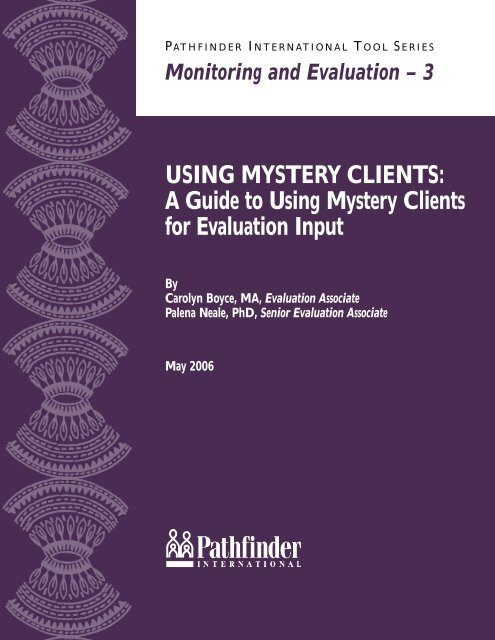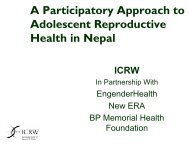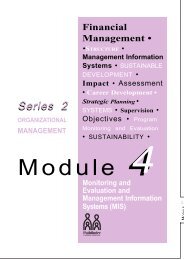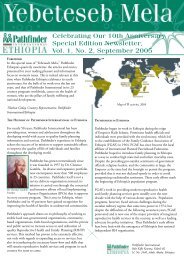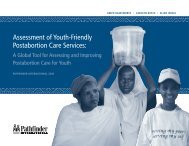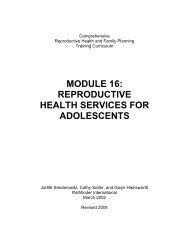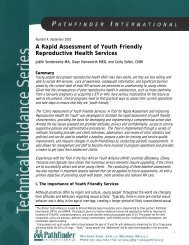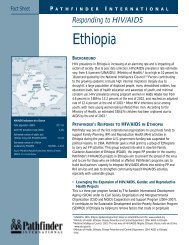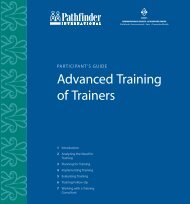USING MYSTERY CLIENTS - Pathfinder International
USING MYSTERY CLIENTS - Pathfinder International
USING MYSTERY CLIENTS - Pathfinder International
You also want an ePaper? Increase the reach of your titles
YUMPU automatically turns print PDFs into web optimized ePapers that Google loves.
P ATHFINDER I NTERNATIONAL T OOL S ERIES<br />
Monitoring and Evaluation – 3<br />
<strong>USING</strong> <strong>MYSTERY</strong> <strong>CLIENTS</strong>:<br />
A Guide to Using Mystery Clients<br />
for Evaluation Input<br />
By<br />
Carolyn Boyce, MA, Evaluation Associate<br />
Palena Neale, PhD, Senior Evaluation Associate<br />
May 2006
P ATHFINDER I NTERNATIONAL T OOL S ERIES<br />
Monitoring and Evaluation – 3<br />
<strong>USING</strong> <strong>MYSTERY</strong> <strong>CLIENTS</strong>:<br />
A Guide to Using Mystery Clients<br />
for Evaluation Input<br />
By<br />
Carolyn Boyce, MA, Evaluation Associate<br />
Palena Neale, PhD, Senior Evaluation Associate<br />
May 2006
Acknowledgements<br />
The authors would like to thank the following <strong>Pathfinder</strong> employees and partners for their<br />
technical inputs into this document: Anne Palmer (Futures Group <strong>International</strong>), Ugo<br />
Daniels (African Youth Alliance (AYA)), Veronique Dupont (<strong>Pathfinder</strong>/Extending Service<br />
Delivery (ESD), Cathy Solter, Lauren Dunnington, and Shannon Pryor (<strong>Pathfinder</strong><br />
headquarters). Jenny Wilder and Mary Burket are also thanked for their inputs and<br />
assistance in editing and producing this document.<br />
2 PATHFINDER INTERNATIONAL: <strong>USING</strong> <strong>MYSTERY</strong> <strong>CLIENTS</strong>
What are Mystery Clients<br />
Mystery clients are trained people (usually community members) who visit program<br />
facilities in the assumed role of clients, and then report (by completing a survey or through<br />
an interview) on their experience. For example, an adolescent might be sent to a health<br />
clinic looking for contraceptive services, and then be interviewed to find out about the<br />
quality of the visit.<br />
When is the Use of Mystery Clients Appropriate<br />
The use of mystery clients is primarily for the monitoring of site improvements, rather<br />
than as an evaluation tool. Information from the mystery client is fed back to the clinic so<br />
that the clinic can improve its service provision. It is recommended that clinics are involved<br />
in the planning of the mystery client visits, in addition to being informed of the potential<br />
visits (though they will not be informed which clients are the mystery clients), to increase<br />
the use of the findings (and thus improve service provision where necessary).<br />
Mystery clients might be used in an effort to avoid the bias in the service delivery process<br />
that often results from having service transactions observed. They can also serve to gather a<br />
sufficient number of observations of service transactions when the actual volume of service<br />
visits is low.<br />
It should be mentioned that some researchers believe that the use of mystery clients is<br />
problematic because the process involves misrepresentation. For example, though consent<br />
might be obtained from clinic management, service providers may not have given their<br />
consent and may find it deceitful. However, others believe that the benefits outweigh the<br />
concerns. Because mystery clients are used to assess and improve the quality of services,<br />
they serve the interests of both clients and the program by highlighting the ways that the<br />
facility can serve its target audience. Mystery clients should not undergo any type of<br />
medical exam or procedure during their visits.<br />
PATHFINDER INTERNATIONAL: <strong>USING</strong> <strong>MYSTERY</strong> <strong>CLIENTS</strong> 3
What are the Advantages and Limitations of Mystery Client Interviews<br />
The primary advantages of using mystery clients, as described above, are for avoiding bias<br />
in service delivery observation and increasing the number of observations of service<br />
provision for program improvement. However, there are a few limitations and pitfalls, each<br />
of which is described below.<br />
Recruitment can be difficult: In smaller communities, it may be difficult to recruit mystery<br />
clients. Mystery clients are community members that should not be recognized by the<br />
facility staff, and finding community members that will not be recognized in a small<br />
community could be difficult.<br />
Dependent on mystery client recall: Mystery clients are either interviewed or surveyed<br />
following their clinic visits, but depending on the length of time, it might be difficult for<br />
them to recall their experience during the service visit. Though they may take notes<br />
following the visit, these notes are dependent on their ability to recall facts and information<br />
they saw or experienced (i.e., recall bias). Sometimes mystery clients make visits in pairs to<br />
aid their recall.<br />
Need to ensure reliability: Reliability refers to the extent to which an experiment, test, or any<br />
measuring procedure yields the same result on repeated trials. This means that the<br />
interview/survey results would be the same if two mystery clients went to the same clinic<br />
and experienced the same interaction. In order to ensure reliability, mystery clients should<br />
be given instruction on how to rate the facility. One way to do this is to define any criteria<br />
for the elements being assessed and discuss these in the mystery client training. An<br />
additional way to ensure reliability is by asking mystery clients to give explanations of their<br />
ratings on the survey or during the interview. For example, a mystery client may respond<br />
that staff was friendly; when asked why, she might explain that the provider smiled a lot<br />
and treated her with respect.<br />
Information produced can be limited: Because mystery clients do not undergo any medical<br />
exams or procedures, they cannot collect information on provision of these services.<br />
Information collected about the service provider includes friendliness during the visit,<br />
whether the provider corrects false information that the mystery client has presented,<br />
whether the provider ensures the client’s comprehension of information, etc. Note that<br />
information on provision of exams or procedures, however, could be collected through the<br />
method of exit interviews with “real” clients.<br />
4 PATHFINDER INTERNATIONAL: <strong>USING</strong> <strong>MYSTERY</strong> <strong>CLIENTS</strong>
What is the Process for Conducting Mystery Client Interviews<br />
The process for using mystery clients follows the same general process as is followed for<br />
other research: plan, develop instruments, train mystery clients, collect data, analyze data,<br />
and disseminate findings. More detailed steps are given below.<br />
1. Plan<br />
• Identify potential clinics and obtain consent, preferably written, from each. (See<br />
Appendix 1 for “Sample Clinic Consent Form.”)<br />
• Identify potential mystery clients and obtain consent, preferably written, from each<br />
youth and their legal guardians/parents. (See Appendix 2 for “Sample Mystery Client<br />
Consent Form.”)<br />
• Develop a schedule of facility visits and corresponding debriefing interviews.<br />
• Ensure research will follow international and national ethical research standards,<br />
including review by ethical research committees. For more information, please see the<br />
<strong>International</strong> Ethical Guidelines for Biomedical Research Involving Human Subjects,<br />
available at http://www.cioms.ch/frame_guidelines_nov_2002.htm. See also Ethical<br />
Approaches to Gathering Information from Children and Adolescents in <strong>International</strong><br />
Setting: Guidelines and Resources, available at http://www.popcouncil.org/pdfs/<br />
horizons/childrenethics.pdf.<br />
2. Develop Instruments<br />
• Brainstorm scenarios and personality traits for mystery clients to act out. (See<br />
Appendix 3 and 4 for “Sample Mystery Client Scenarios” and “Mystery Client<br />
Discussion/Role Play Questions.”) Mystery clients and their scenarios and personality<br />
traits need to be representative of the types of clients, services being sought, and other<br />
traits that the clinics chosen typically serve. For example, if most of the clients of a<br />
particular clinic are adolescent females, your choice of mystery clients should<br />
reflect this. The same holds true for factors such as urban/rural, married/unmarried,<br />
in-school/out-of-school. In addition, if the visits to a clinic are primarily for STI<br />
information and services, then the scenarios should also reflect this.<br />
• Develop an interview protocol for the interviewers of the mystery clients—the rules<br />
that guide the administration and implementation of the interviews. Put simply,<br />
these are the instructions that are followed for each interview, to ensure consistency<br />
PATHFINDER INTERNATIONAL: <strong>USING</strong> <strong>MYSTERY</strong> <strong>CLIENTS</strong> 5
etween interviews, and thus increase the reliability of the findings. The following<br />
instructions for the interviewer should be included in the protocol:<br />
• What to say to interviewees when setting up the interview.<br />
• What to say to interviewees when beginning the interview.<br />
• What to say to interviewees in concluding the interview.<br />
• What to do during the interview. (Take notes Audiotape Both)<br />
• What to do following the interview. (Fill in notes Check audiotape for clarity<br />
Summarize key information for each Submit written findings)<br />
• Develop an interview guide that lists the questions or issues to be explored during<br />
the interviews with the mystery clients. (See Appendix 4 for “Mystery Client<br />
Interview Guide.”)<br />
3. Train Interviewers and Mystery Clients<br />
• Mystery clients select their scenarios.<br />
• Mystery clients discuss and/or role play their scenarios.<br />
• Mystery clients are briefed on potential criteria being evaluated.<br />
• Mystery clients are given reminders for visit (see “Reminders for Mystery Clients”).<br />
Reminders for Mystery Clients<br />
• Be “in character” upon going to the clinic.<br />
• Do not tell anyone at the clinic of your assignment.<br />
• Do not use your real name and age if you have to register for services.<br />
• Do not undergo any type of exam or procedure.<br />
• Record amount of time spent waiting and participating in the visit.<br />
• Collect educational materials.<br />
• Meet with an interviewer immediately after the experience (when possible).<br />
• Identify interviewers and train (see “Training Tips for Data Collectors” 1 ). The ideal<br />
interviewer is an experienced one, but could be a trained program staff member.<br />
The interviewer should not be anyone associated with the clinic(s) being visited.<br />
• Where necessary, use interviewers that speak the local language.<br />
1<br />
Adamchak, S. et.al. (2000). A Guide To Monitoring and Evaluating Adolescent Reproductive Health Programs. Available at<br />
http://www.pathfind.org/site/PageServerpagename=Publications_FOCUS_Guides_and_Tools<br />
6 PATHFINDER INTERNATIONAL: <strong>USING</strong> <strong>MYSTERY</strong> <strong>CLIENTS</strong>
Training Tips for Data Collectors<br />
Staff, youth program participants, or professional interviewers may be involved in data<br />
collection. Regardless of what experience data collectors have, training should include:<br />
• An introduction to the evaluation objectives,<br />
• A review of data collection techniques,<br />
• A thorough review of the data collection items and instruments,<br />
• Practice in the use of the instruments,<br />
• Skill-building exercises on interviewing and interpersonal communication, and<br />
• Discussion of ethical issues.<br />
4. Collect Data<br />
• Mystery clients go to assigned clinic.<br />
• Mystery clients conduct clinic visit, using assigned scenario.<br />
• Mystery clients make notes immediately after the visit on waiting times, what<br />
happened during the visit, and their assessments of cleanliness, friendliness, and<br />
information given.<br />
• Mystery clients are interviewed as soon as possible following their visit (preferably<br />
immediately after the visit to aid in their recall of events). See “Mystery Client<br />
Interview Guide” (Appendix 5) for examples of questions.<br />
5. Analyze Data<br />
• Review all interview data looking for patterns or themes among the responses.<br />
6. Disseminate Findings<br />
• Prepare a summary of results (see “How are the Results of Mystery Client Interviews<br />
Presented”).<br />
• Discuss findings and possible improvements with clinic staff.<br />
• Prepare result report.<br />
• Disseminate to all stakeholders, including the clinic(s) visited.<br />
PATHFINDER INTERNATIONAL: <strong>USING</strong> <strong>MYSTERY</strong> <strong>CLIENTS</strong> 7
How are the Results of Mystery Client Interviews Presented<br />
Mystery client interview results are flexible in that they can be presented in a number of<br />
ways—there is no specific format to follow. As with all results, however, justification and<br />
methodology of the study should be provided, as well as any supporting information<br />
(i.e., copies of instruments used in the study). Mystery client interview results may stand<br />
alone or be included in a larger evaluation report. If presented as a stand-alone report, the<br />
following report outline is suggested:<br />
1. Introduction and Justification<br />
2. Methodology<br />
a. How was the process carried out (Describe the process of selecting and training the<br />
mystery clients, selecting the clinic(s), and conducting the visits.)<br />
b. What assumptions are there (if any)<br />
c. Are there any limitations with this method<br />
d. What instruments were used to collect data (You may want to include some or all<br />
in the appendix.)<br />
e. What sample(s) is/are being used<br />
f. Over what period of time was this data collected<br />
3. Results<br />
a. What are the key findings<br />
b. What were the strengths and limitations of the tools<br />
c. Where and how are the results similar and dissimilar to other findings (if other<br />
studies were done)<br />
4. Recommendations and Conclusion<br />
5. Appendices (including instruments)<br />
Where Can More Information on Mystery Client Interviews<br />
be Found<br />
Adamchak, S., et. al. (2000). A Guide To Monitoring and Evaluating Adolescent Reproductive<br />
Health Programs. Available at http://www.pathfind.org/site/PageServerpagename=<br />
Publications_FOCUS_Guides_and_Tools<br />
Naré, Christine, Katz, K. and Tolley, E. (1997). Adolescents’ Access to Reproductive Health<br />
and Family Planning Services in Dakar (Senegal). (Harvard University Working Papers).<br />
Available at http://www.hsph.harvard.edu/Organizations/healthnet/HUpapers/97_04.pdf<br />
Palmer, Lucy. (2003). Private Sector Providers: Do they behave the way they say they do Bath,<br />
U.K., Futures Group. (Futures Group Briefing). Available at http://tfgi.com/Documents/<br />
PvtSecProvidersBrief.pdf<br />
8 PATHFINDER INTERNATIONAL: <strong>USING</strong> <strong>MYSTERY</strong> <strong>CLIENTS</strong>
Appendix 1: Sample Clinic Consent Form<br />
I want to thank you for taking the time to meet with me today. My name is<br />
_______________________ and I would like to talk to you about the possibility of<br />
having mystery clients visit your clinic as a means to improve youth-friendly service<br />
provision under the African Youth Alliance (AYA) project.<br />
Within the next month, one or more youth will visit your clinic seeking sexual and<br />
reproductive health information. The mystery clients have been trained to examine key<br />
components of service provision during their visits, including clinic layout, friendliness<br />
of staff, and quality of sexual and reproductive health counseling. Following the clinic<br />
visit, the mystery clients will be interviewed by AYA project staff to record their<br />
observations. Here is a copy of the interview form that will be used (give clinic manager<br />
a copy of the interview form). Mystery client results will be summarized and discussed<br />
in a meeting of AYA project and clinic staff. Recommendations for improvement will<br />
be decided upon jointly.<br />
I want to emphasize that mystery clients are not being trained to find mistakes or faults<br />
with the clinic, but as a key target audience of the clinic, can observe ways in which the<br />
clinic might improve to better serve them. Also, I want to note that mystery clients have<br />
been instructed that they are not to receive any services during the clinics visit (such as tests<br />
or exams), but are limited to receiving information and counseling on sexual and<br />
reproductive health topics only. This is intended to minimize mystery client use of the<br />
clinic’s limited staff time and supplies.<br />
Are there any questions about what I have just explained<br />
Is your clinic willing to participate in the mystery client exercise<br />
_________________________ _________________________ _____________<br />
Clinic Manager Witness Date<br />
PATHFINDER INTERNATIONAL: SAMPLE CLINIC CONSENT FORM 9
Appendix 2: Sample Mystery Client Consent Form<br />
I want to thank you for taking the time to meet with me today. My name is<br />
________________ and I would like to talk to you about serving as a mystery client for<br />
the African Youth Alliance (AYA) project. The purpose of this work is to improve service<br />
provision to youth at clinics supported under this project.<br />
Your participation would include the following:<br />
• Training on how to conduct a mystery client visit<br />
• A visit to one or more clinics as a mystery client<br />
• Completion of an interview regarding the clinic and the visit<br />
I want to note that you will not receive any services during the clinics visit (such as tests or<br />
exams), but may receive information and counseling on sexual and reproductive health<br />
topics.<br />
All interview responses will be kept confidential and the interview should take less than an<br />
hour.<br />
Are there any questions about what I have just explained<br />
Are you willing to participate as a mystery client<br />
__________________________ __________________________ _____________<br />
Interviewee Witness Date<br />
___________________________________<br />
Legal guardian (if mystery client is under 18)<br />
10 PATHFINDER INTERNATIONAL: SAMPLE <strong>MYSTERY</strong> CLIENT CONSENT FORM
Appendix 3: Sample Mystery Client Scenarios<br />
Scenario 1: Young adult female feeling pressured to have intercourse<br />
A 16 year-old woman comes to the facility to obtain birth control. She tells the provider<br />
that she has never had intercourse before. It becomes apparent that she is not sure if she<br />
really wants to have intercourse, but she is feeling pressured by her boyfriend to do so. She<br />
believes if she does not give in he will leave her, but she does not feel ready to initiate<br />
sexual activity.<br />
Her parents: very strict, she does not want them to know anything about this.<br />
Her partner: a schoolmate, has been her boyfriend for one year.<br />
Sexual history: none<br />
Contraceptive knowledge: very limited, has only heard of the pill and has many erroneous<br />
ideas about its use and possible side effects.<br />
The young person acting as the mystery client should fill in the blanks about<br />
• What types of things the boyfriend says to her to have intercourse with him,<br />
• Why she is afraid to have sexual intercourse, and<br />
• Her motivations for coming to the clinic.<br />
Scenario 2: Young adult male seeking information regarding STIs<br />
An 18 year-old male wants information regarding Sexually Transmitted Infections (STIs).<br />
His motivation for coming to the clinic is that he heard of a guy who got an STI from<br />
having intercourse with a commercial sex worker.<br />
Sexual history: he is sexually active and has had intercourse with approximately five women.<br />
Contraceptive use: has used condoms only occasionally and does not like them.<br />
Reproductive health knowledge: very limited, has heard of a few diseases. The only symptom<br />
he has heard of is itching. He has heard that AIDS can kill you and thinks that AIDS only<br />
affects prostitutes.<br />
PATHFINDER INTERNATIONAL: SAMPLE <strong>MYSTERY</strong> CLIENT SCENARIOS 11
Appendix 4: Mystery Client Discussion/Role Play Questions<br />
After selecting their scenarios, mystery clients should take time to discuss and role play the<br />
scenarios in preparation for their client visit. The questions provided below might be used<br />
to guide this preparation process.<br />
• What is the person like (personality traits)<br />
• How does this person feel about the situation s/he finds her/himself in<br />
• How does this person feel about speaking to a provider about his/her situation<br />
• What would you do in this person’s situation<br />
• How does this person behave<br />
• What kind of body language does this person have<br />
• Where does this person live/go to school<br />
• Has this person talked to anyone else about their situation<br />
• Why has this person not talked to their parents<br />
• Why has this person not talked to their partner<br />
• How do you think this person’s parents would react if they found out<br />
• Why did this person decide to come to this facility<br />
• Has this person ever had sexual intercourse<br />
• Is this person currently having sexual relations with anyone<br />
• Has this person ever used contraception<br />
• Has this person ever used a condom<br />
• How much does this person know about AIDS, contraceptives, and STIs<br />
12 PATHFINDER INTERNATIONAL: <strong>MYSTERY</strong> CLIENT DISCUSSION/ROLE PLAY QUESTIONS
Appendix 5: Mystery Client Interview Guide 2<br />
This interview guide could be used to collect information from the mystery client<br />
following their clinic visit. Mystery clients are either given a copy of the interview guide to<br />
make notes on or make separate notes immediately following the visit, and then are<br />
interviewed shortly after.<br />
Introduction: I want to thank you for taking the time to meet with me today. My name is<br />
__________________ and I would like to talk to you about your mystery client clinic visit.<br />
All responses will be kept confidential and the interview should take less than an hour.<br />
I am taping the session because I don’t want to miss any of your comments. I will be taking<br />
some notes during the session, but I can’t possibly write fast enough to get it all down.<br />
Because we’re on tape, please be sure to speak up so that we don’t miss your comments.<br />
Are there any questions before we begin<br />
QUESTIONS RESPONSE REMARKS<br />
Scenario enacted: _________<br />
A. Unwanted Pregnancy<br />
B. Information regarding contraceptives<br />
C. Information regarding STIs<br />
D. Counseling regarding premarital intercourse<br />
E. Other ______________<br />
A. LOCATION AND ENVIRONMENT<br />
Health Facility (name and number):<br />
District (name and number):<br />
Region (name and number):<br />
Date of interview:<br />
Level of facility where mystery client went:<br />
Locality of facility:<br />
Age of mystery client:<br />
Sex of mystery client:<br />
Date: _____/_____/_____<br />
Referral hospital, Hospital,<br />
Pharmacy, Health center, Health post,<br />
Mobile health clinic, clinic in<br />
nonpermanent facility (e.g., schools,<br />
rotating rural outposts, youth centers, etc.),<br />
other_____________<br />
Rural, Urban, Peri-Urban<br />
___________ years<br />
Male, Female<br />
Name of interviewer:<br />
Time client arrived at clinic:<br />
2<br />
Adapted from the Questionnaire for Debriefing Mystery Clients, appearing in A Guide to Monitoring and Evaluating Adolescent Reproductive<br />
Health Programs, FOCUS on Young Adults.<br />
PATHFINDER INTERNATIONAL: <strong>MYSTERY</strong> CLIENT INTERVIEW GUIDE 13
QUESTIONS RESPONSE REMARKS<br />
Did you find the facility easily<br />
Were there any directional signs outside the facility<br />
Were there any directional signs within the facility<br />
How did you find the welcoming<br />
Was the outside of the facility clean<br />
Was the inside of the facility clean<br />
Was there a separate waiting room for adolescents<br />
Were there posters on STDs and other<br />
SRH issues in the facility<br />
Did you find any poster stating the rights of the client<br />
How many adolescents did you find waiting<br />
to see the provider at the facility<br />
Yes<br />
No<br />
Yes<br />
No<br />
Yes<br />
No<br />
Friendly<br />
Not friendly<br />
Very clean<br />
Somewhat clean<br />
Unclean<br />
Very clean<br />
Somewhat clean<br />
Unclean<br />
Yes<br />
No<br />
Yes<br />
No<br />
Yes<br />
No<br />
Number ___________<br />
How long did you have to wait before being attended to<br />
How did you feel about the waiting time<br />
Just OK<br />
Too long<br />
B. INSTRUCTION/EDUCATION<br />
How many providers attended to you during the<br />
service delivery process<br />
Number ___________<br />
How would you judge the attitude of each provider Security a. friendly<br />
b. not friendly<br />
Registration<br />
History<br />
Consultation/examination<br />
Laboratory<br />
Dispensary<br />
a. friendly<br />
b. not friendly<br />
a. friendly<br />
b. not friendly<br />
a. friendly<br />
b. not friendly<br />
a. friendly<br />
b. not friendly<br />
a. friendly<br />
b. not friendly<br />
14 PATHFINDER INTERNATIONAL: <strong>MYSTERY</strong> CLIENT INTERVIEW GUIDE
QUESTIONS RESPONSE REMARKS<br />
Was your medical history taken<br />
Was your social record taken<br />
Was your sexual history taken<br />
Were you assured of confidentiality<br />
Were you counseled in a place where visual<br />
privacy was guaranteed<br />
Were you counseled in a place where<br />
auditory privacy was guaranteed<br />
Were you counseled on any contraceptive methods<br />
Did the provider physically examine you<br />
Were you examined in a place where visual<br />
privacy was guaranteed<br />
Did the provider give you any treatment<br />
Did he/she give you instructions on how to<br />
use the treatment<br />
Did you feel the provider had adequate time for you<br />
during consultation<br />
Did the provider talk about HIV/AIDS with you<br />
Yes<br />
No<br />
Yes<br />
No<br />
Yes<br />
No<br />
Yes<br />
No<br />
Yes<br />
No<br />
Yes<br />
No<br />
Yes<br />
No<br />
Yes<br />
No<br />
Yes<br />
No<br />
Yes<br />
No<br />
Yes<br />
No<br />
Yes<br />
No<br />
Yes<br />
No<br />
If yes, what did he/she say<br />
If you reported an STI case, did the provider ask<br />
you to bring your partner for treatment<br />
Did the provider give you an opportunity to ask questions<br />
Were you given any educational materials to read<br />
Did you pay for the service you received<br />
What did you think about the cost<br />
Yes<br />
No<br />
Yes<br />
No<br />
Yes<br />
No<br />
Yes<br />
No<br />
Expensive<br />
Affordable<br />
Cheap<br />
PATHFINDER INTERNATIONAL: <strong>MYSTERY</strong> CLIENT INTERVIEW GUIDE 15
QUESTIONS RESPONSE REMARKS<br />
How much time did you spend with each provider<br />
Registration<br />
History<br />
1st Consultation<br />
Laboratory<br />
2nd Consultation<br />
Injection<br />
Dispensary<br />
In general, how did you find the counseling<br />
Did the provider ask you to return<br />
If yes, did he/she give you a specific date to return<br />
Will you recommend this facility to any of your<br />
colleague youth<br />
Satisfactory<br />
Not Satisfactory<br />
Yes<br />
No<br />
Yes<br />
No<br />
Yes<br />
No<br />
If no, what are your reasons<br />
Is there anything more that you would like to add<br />
Thank you for your time.<br />
16 PATHFINDER INTERNATIONAL: <strong>MYSTERY</strong> CLIENT INTERVIEW GUIDE
<strong>Pathfinder</strong> <strong>International</strong><br />
9 Galen Street, Suite 217<br />
Watertown, MA 02472<br />
USA<br />
Tel: 617-924-7200<br />
Email: Information@pathfind.org<br />
05/06/500


